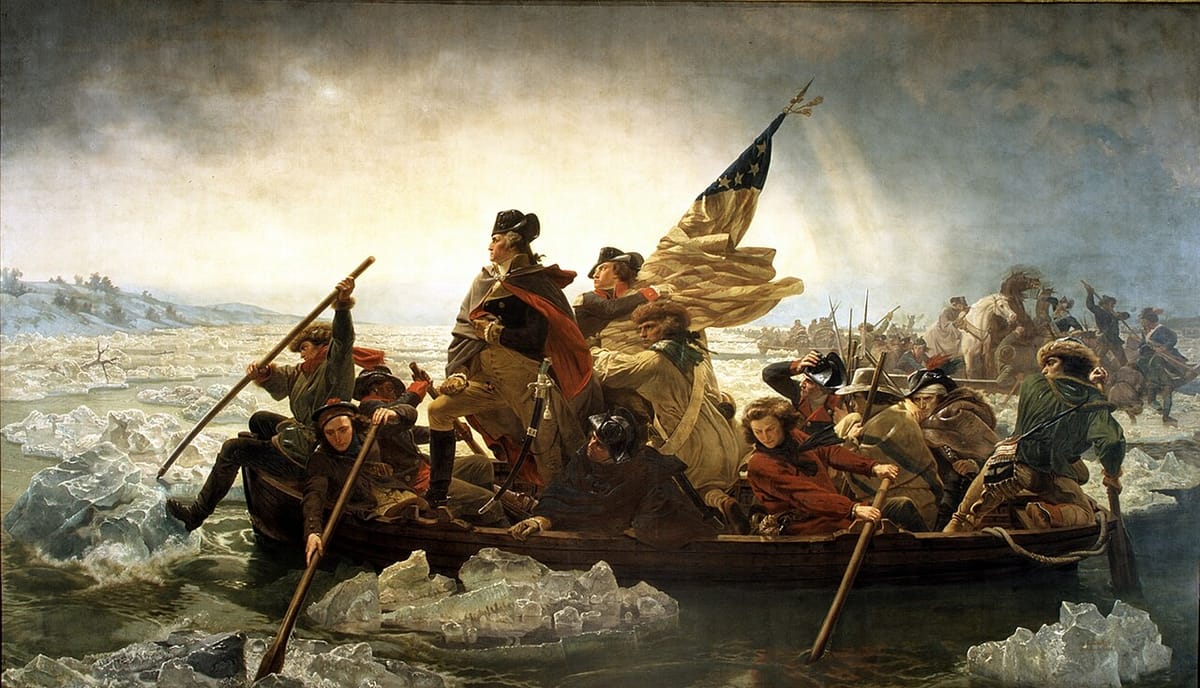To Love a Republic: A Common Horizon Beyond the Tribes of Identity
Patriotism need not be grievance or bloodline. At its best, it is love and affection for liberty, equality, and justice—an inheritance wide enough to hold a fractured people, and demanding enough to call us beyond tribe toward a shared republic of ideals.

The fireworks still streak across American skies each Fourth of July, but the civic music that once accompanied them has grown faint. At the dawn of the twenty-first century, nearly nine in ten citizens told Gallup they were proud to be American. By 2025, that figure had fallen to 58 percent—the lowest ever recorded. Beneath the surface, the divide is even sharper: ninety-two percent of Republicans still report pride in their country, while barely a third of Democrats do. Among Generation Z, fewer than two in five say they are proud at all (Gallup, 2025). A republic that once drew strength from confidence has begun to doubt its own reason for being.
This is no passing mood. It reflects a deeper confusion about the nature of civic love itself. Patriotism—an affection for country rooted in gratitude and ideals—has been blurred with a specific interpretation of nationalism, as a politics of grievance and power. The result is a zero-sum struggle over identity, in which hatred of political opponents, “negative partisanship,” has become a stronger bond than loyalty to institutions or ideals (Iyengar & Westwood, 2015). The way back requires recovering the distinction and reclaiming a patriotism of ideals: a creed-based loyalty capacious enough to unite a diverse people without demanding uniformity.
Patriotism—an affection for country rooted in gratitude and ideals—has been blurred with nationalism, a politics of grievance and power.
George Orwell drew the line sharply in 1945. Patriotism, he wrote, is “devotion to a particular place and a particular way of life… which one believes to be the best in the world but has no wish to force upon other people. Patriotism is of its nature defensive… Nationalism, on the other hand, is inseparable from the desire for power” (Notes on Nationalism). One is affection; the other appetite. Political psychology adds another nuance. “Blind patriotism” demands uncritical loyalty and slides easily into nationalism. “Constructive patriotism” measures the nation “from the basis of a critical conscience,” seeing dissent as fidelity rather than betrayal (Schatz, Staub, Lavine, 1999).
Frederick Douglass embodied this higher form of patriotism in his searing 1852 address, What to the Slave is the Fourth of July? Speaking on Independence Day, he exposed the hypocrisy of a nation that rang bells of liberty while millions remained enslaved. “This Fourth of July is yours, not mine,” he thundered. “You may rejoice, I must mourn.” It was, he said, “a thin veil to cover up crimes which would disgrace a nation of savages.” Yet even amid such righteous indignation, Douglass refused despair. He turned, with almost prophetic cadence, back to the nation’s founding words: “Interpreted as it ought to be interpreted, the Constitution is a glorious liberty document.” The Declaration’s promise that “all men are created equal” was not, in his eyes, an empty flourish. It was a moral weapon. “I do not despair of this country,” he declared, because those very words armed him with the authority to indict America’s sins. For Douglass, the ideals were not false; they were betrayed. Patriotism, in his vision, was not blind loyalty but a relentless holding of the nation to its own promises. He loved America enough to demand its repentance. His was a patriotism of fierce affection—critical, hopeful, and unyielding in the belief that principles proclaimed so boldly could not forever be denied.
Patriotism, in his vision, was not blind loyalty but a relentless holding of the nation to its own promises. He loved America enough to demand its repentance. His was a patriotism of fierce affection—critical, hopeful, and unyielding in the belief that principles proclaimed so boldly could not forever be denied.
The fracture in our politics is thus between two “We the Peoples.” One vision is civic, defining belonging by consent to shared principles. The other is ethnic, defining nationhood by blood, birth, or culture. Pew surveys make the split clear: conservatives are far more likely to see being born in the U.S., or sharing traditions as “essential” to being truly American, while liberals emphasize values and citizenship. These are not trivial differences. One points toward an inclusive loyalty grounded in ideals, the other toward a politics of siege.
If nationalism is the pathology, constitutional patriotism is the cure. Jürgen Habermas - a philosopher of the Frankfurt School and one of postwar Europe’s most influential "leftist" thinkers - coined the term Verfassungspatriotismus in postwar Germany: allegiance grounded not in ancestry but in the universal norms of a democratic constitution. Yet America, providentially, was born to this role. Unlike older nations, it was founded on propositions—“all men are created equal”—and its civic religion has never been blood but belief. Our central narrative is not perfection but struggle: abolition, suffrage, civil rights—each chapter a painful attempt to close the gap between the creed and the country. As Danielle Allen puts it, freedom and equality must be seen as “interdependent,” for only equal standing makes self-government possible (Our Declaration, 2014).
Unlike older nations, it [America] was founded on propositions—“all men are created equal”—and its civic religion has never been blood but belief.
Too often this civic vision is dismissed as a merely liberal project. In truth, it resonates deeply with conservative and Catholic traditions that discipline patriotism by loves higher than the state. Edmund Burke and Roger Scruton both praised the “love of the familiar” while warning against the dangers of abstract, ideological nationalism. Lord Acton, the Catholic liberal, saw the cult of nationality as a “threat to liberty,” arguing in his 1862 essay Nationality that the modern dogma of ethnic homogeneity endangered human freedom: “The combination of different nations in one State is as necessary a condition of civilized life as the combination of men in society. The co-existence of several nations under the same State is a test, as well as the best security of its freedom” (The History of Freedom and Other Essays, 1907, p. 277). For Acton, diversity within states acted as a check on absolutism. Catholic teaching makes the point theological: patriotism is a duty of gratitude, but nationalism—when swollen into idolatry—is a sin.
John Courtney Murray, S.J., made the American application explicit. In his 1960 classic We Hold These Truths: Catholic Reflections on the American Proposition, Murray argued that the American founding creed was not only compatible with Catholic doctrine but consonant with it, because it acknowledged a truth higher than the state. “The American consensus,” he wrote, “is a public consensus on the dignity of man, on the rights of the human person, and on the limitation of public power by the recognition of these rights” (We Hold These Truths, 1960, p. 44).
No one expressed this more forcefully than St. John Paul II. He frequently pointed to America’s founding creed as an example of how political life can be anchored in transcendent truths. The Declaration of Independence speaks of rights “endowed by their Creator,” and for John Paul this was no rhetorical flourish but a safeguard against tyranny: rights bestowed by governments can be revoked by governments; rights rooted in the Creator are inviolable. Addressing the United Nations in 1995, he affirmed that “there are indeed universal human rights, rooted in the nature of the person, rights which reflect the objective and inviolable demands of a universal moral law”. In the same speech he drew a sharp contrast: “True patriotism never seeks to advance the well-being of one’s own nation at the expense of others… Nationalism… is thus the antithesis of true patriotism”. That same year, in Evangelium Vitae, he warned that “the value of democracy stands or falls with the values which it embodies and promotes”, and insisted that democracy is sustainable only when it recognizes a dignity “which no individual, no group, no authority, no State can change”.
Read together, these texts reveal a remarkable continuity: that America’s noblest tradition does not rest on blood or power but on principle—a patriotism made safe for pluralism because it honors the inviolable dignity of every human being.
The empirical reality makes this intellectual debate urgent. National pride has collapsed among Democrats and the young even as it remains high on the right, producing a widening generational and partisan divide. Into this vacuum has rushed, on one side, grievance-based nationalism and, on the other, a disaffection that easily shades into outright rejection of America itself. Each extremity feeds the other, accelerating polarization and dissolving the common narrative—that despite its sins America remains worth loving and repairing. The path forward lies neither in jingoism nor in cynicism, but in cultivating what scholars call constructive patriotism: a civic affection that is both critical and loyal. This requires renewing civic education so that America is taught not as a monument to be blindly venerated or summarily condemned, but as an unfinished argument in which every generation has a stake. It requires fostering shared service, where citizens, shoulder to shoulder, rediscover solidarity in common work. And it requires reviving the habits of civic dialogue—seeing opponents not as enemies to be crushed but as fellow heirs of a fragile inheritance.
Lincoln, at the brink of civil war, understood better than anyone that a republic cannot survive if its people cease to recognize one another as fellow citizens. In his First Inaugural Address of March 1861, delivered as seven states had already seceded, he pleaded with the South: “We are not enemies, but friends. We must not be enemies.” He evoked the “mystic chords of memory” — the shared sacrifices and affections of a people — which, he believed, would yet be “touched… by the better angels of our nature.” It was not naïveté but statesmanship: an appeal to memory, affection, and principle all at once, in the hope of averting catastrophe.
To reclaim patriotism today is to echo Lincoln’s plea and Douglass’s paradox: to condemn America’s sins precisely because we trust its creed. It is to practice gratitude for a homeland without making an idol of it, and to bind national love not to grievance or blood but to the ideals of liberty and law.
That summons remains. To reclaim patriotism today is to echo Lincoln’s plea and Douglass’s paradox: to condemn America’s sins precisely because we trust its creed. It is to practice gratitude for a homeland without making an idol of it, and to bind national love not to grievance or blood but to the ideals of liberty and law. The creed is fragile, and it has been betrayed often. Yet it is also the only banner under which a diverse, fractious people can still walk together. To love America rightly is to love it as Lincoln did — as a republic of ideals, always unfinished, always demanding renewal, and always, in the end, bound together by affection.
“I am loath to close. We are not enemies, but friends. We must not be enemies. Though passion may have strained, it must not break our bonds of affection. The mystic chords of memory, stretching from every battlefield, and patriot grave, to every living heart and hearthstone, all over this broad land, will yet swell the chorus of the Union, when again touched, as surely they will be, by the better angels of our nature.”
—Abraham Lincoln, First Inaugural Address, March 4, 1861






